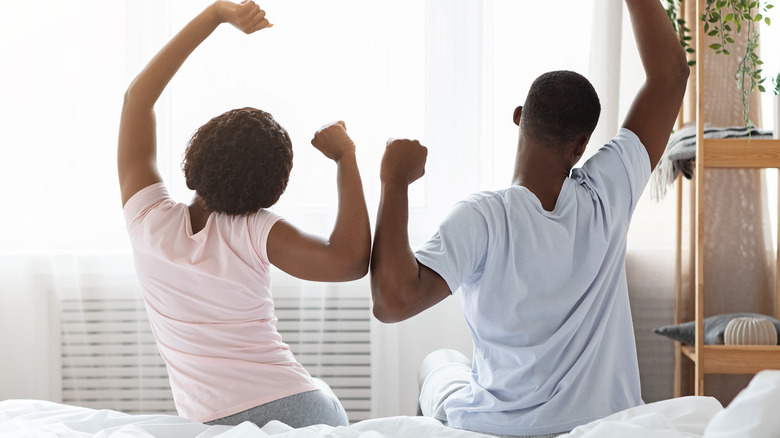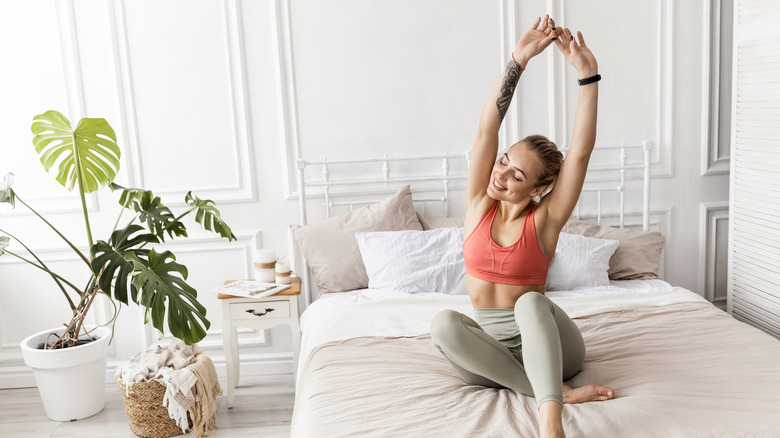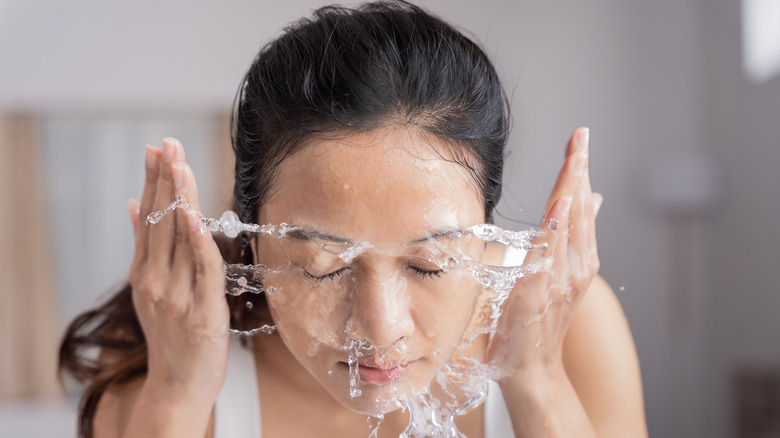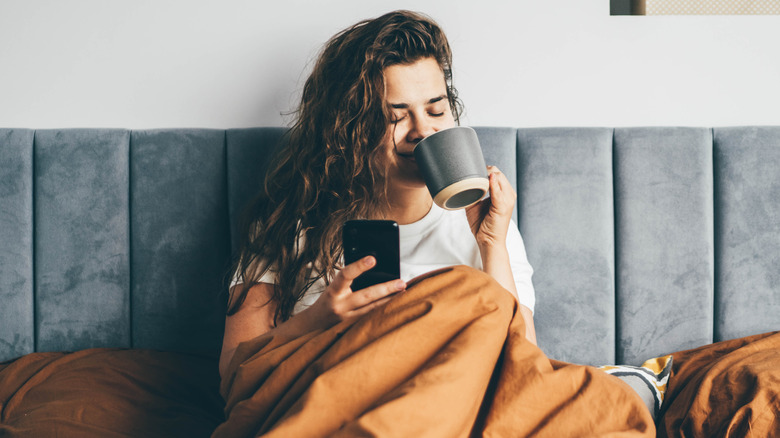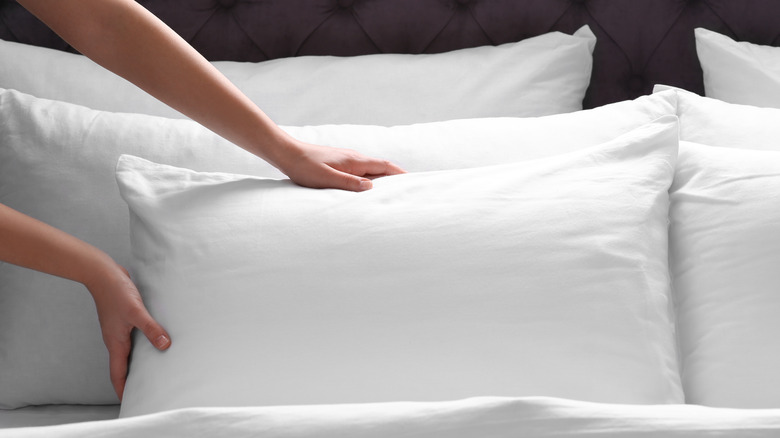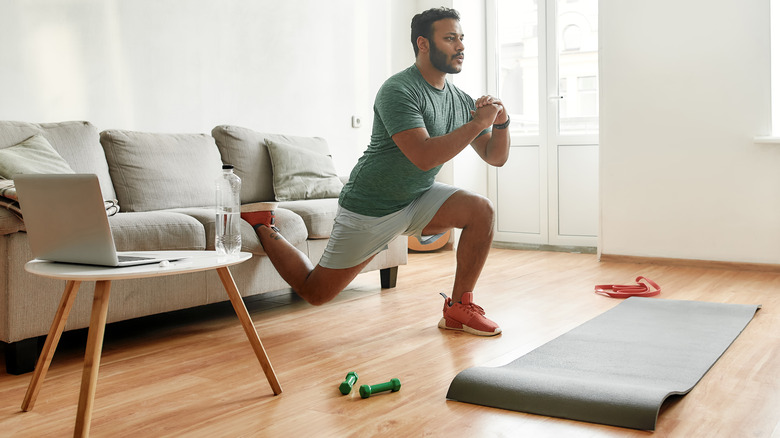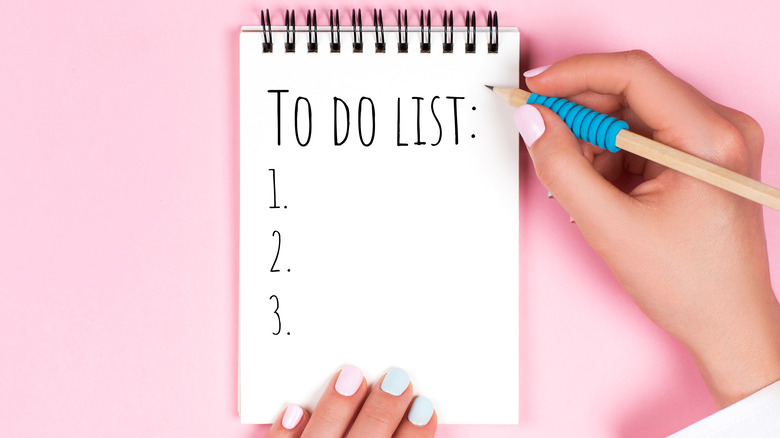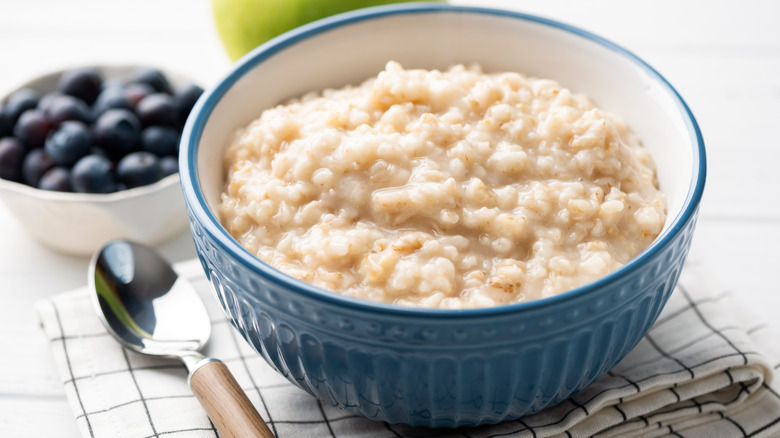What Healthy People Actually Do Every Morning
Whether you're a morning person or not, it's pretty undeniable that there seems to be a knack that some people have for waking up on the right side of the bed. "Your mornings set the tone for the day," registered dietitian Andy De Santis to Global News. According to Verywell Mind, establishing a robust morning routine can help with productivity and offers a range of physical and emotional benefits.
However, it's one thing to have a routine in the morning, and it's another to have the right routine. Too many of us are going through the motions in the morning in the wrong way. If you've ever gazed upon the healthiest, happiest people in your life (with a bagel and second cup of coffee firmly in your hand) and wondered how they're able to be so sprightly early in the day, it might be because of a few specific things they're doing first thing. Let's take a look at what all of those healthy people out there actually do in the morning.
They drink a glass of water
Drinking a glass of water first thing in the morning might sound like a pretty basic way to start your day off healthily, but we promise you won't regret it. "I drink a full, 12-ounce glass of water before I eat anything in the morning," registered dietitian nutritionist Monica Auslander Moreno told Eating Well. According to Moreno, this has multiple benefits, allowing her to rehydrate to make up for the fluid lost throughout the night from sweating and breathing. It also ensures that she's not confusing thirst with hunger before eating breakfast (to avoid overeating), and she adds that it "already sets me a good 15-20% into my daily fluid goal."
What you shouldn't do to rehydrate in the morning, according to obesity medicine specialist for Mount Sinai Maria Peña, is just drink coffee (per USA Today). Peña states that most people do this, but grabbing a bottle of water along with it is the best way to hydrate yourself in preparation for the rest of the day. It's important to remember, however, that the timing of when you drink water during the day won't make much of a difference in terms of hydration, provided you're drinking adequate amounts (via Healthline). However, starting off the day by drinking water gives you a headstart, and it regulates other mechanisms in your body.
They stretch
Stretching your body first thing in the morning is something that the healthiest people among us swear by. Registered dietitian Alanna Waldron kicks off each day by sitting up in bed and stretching her neck and shoulders. "I often am tense when I sleep, and it feels good to relieve some pressure off the upper body if I slept or rested my head on the pillow in an awkward position," Waldron told Eat This, Not That! Fellow registered dietitian Samara Abbott does the same, pointing out that an early-morning stretch can help you feel energized for the rest of the day.
On a muscular level, stretching first thing is something your body will thank you for. As the Harvard Medical School points out, a daily stretching routine can help your muscles stay strong and healthy, and maintain the flexibility that contributes to proper mobility. When we don't stretch, our muscles can tighten and become shorter, and this limits their ability to extend properly when we need them. This puts us at an increased risk of muscle damage, strain, or joint pain. Just stretching now and again in the morning won't cut it to generate proper flexibility, however. "It takes weeks to months to get flexible, and you'll have to continue working on it to maintain it," David Nolan, a Massachusetts-based physical therapist, told the Harvard Medical School.
They wash their face
Incorporating face washing into your morning routine could give you the same glowing skin that the healthy folks seem to have effortlessly. There are "various reasons" for washing your face in the morning, board-certified dermatologist Dr. Orit Markowitz told Byrdie. In addition to washing away any bacteria that's accumulated on your face throughout the night, a morning face wash primes your skin for any morning skincare routine you undertake. It also washes away any overnight skincare left on your face.
Washing your face in the morning is especially important if you're also a morning exercise person. If this is the case, you should also wash your face after you work out, as sweat from the exercise mingling with the bacteria on your skin, clogging pores and causing breakouts. It's worth mentioning, however, that if you wash your face before you go to bed, a full face wash again in the morning isn't really necessary. "If you go right to bed after washing your face, it is not coming in contact with anything that really needs to be washed off," Markowitz told Byrdie. She does, however, still advise a splash of water in the morning, to get rid of any overnight sweat.
They avoid checking their phone right away
If you're someone who reaches for your phone first thing in the morning, you're doing something that healthy people avoid. "I used to scroll through social media every morning before getting out of bed," nutrition therapist and registered dietitian Alissa Rumsey told Eat This, Not That! "But this always caused me to start my day slightly stressed and with low energy." After realizing this, Rumsey switched up her morning routine and now steers clear of her socials and emails until she's gotten out of bed and eaten breakfast. Now, she waits until she gets to her office.
We're here for that level of self-restraint, but why is checking your phone first thing in the morning so stressful? According to psychiatrist Nikole Benders-Hadi, when we look at our phones first thing, we're being hit with an information overload that we're simply not awake enough to deal with (via Elite Daily). Benders-Hadi states that not only does this make us instantly stressed and overwhelmed in some cases, but it also "interferes with your ability to prioritize tasks."
They take a walk
If you're already rushing to get the kids ready and yourself in the morning, the thought of carving time out to take a walk might seem hilariously ambitious. But, if you're able to do so, you won't look back from this healthy habit. According to Healthline, the benefits of taking a walk in the morning, particularly outside, are pretty extensive. Not only could it help to boost your mood, reduce anxiety and stress, and improve self-esteem, but walking can also boost your energy for the day. A 2009 study published in the Journal of Environmental Psychology showed that a 20-minute outdoor walk was even more vitalizing than an indoor walk over the same period of time.
Additionally, a 2019 study published in the British Journal of Sports Medicine suggests that taking a morning walk can help improve mental clarity and focus before starting your day properly. For those seeking to prevent or manage certain health conditions, like heart disease or diabetes, a walk first thing in the day can help to reduce risk and manage symptoms.
They make the bed in the morning
Wait, you're telling us to start your day with a chore? Hear us out: we guarantee you'll thank us at the end of the day. As the Sleep Foundation points out, creating a healthy bedroom environment — including by making your bed — is vital to making a good night's sleep possible. In addition to having the proper temperature, light, and noise conditions in your room, a made bed can help you fall asleep faster. A 2012 poll conducted by the National Sleep Foundation found that people who made their beds regularly (if not daily) said they were more likely to have a better night's sleep.
Making your bed in the morning can not only set you up for sleep at the end of the day, but it's also a quick way to set you up to power through your day's tasks. "If you make your bed every morning, you will have accomplished the first task of the day,″ says William C. McCraven, former U.S. Navy Admiral Seal (via YouTube). "It will encourage you to do another task, and another, and another. And by the end of the day that one task completed will have turned into many tasks completed."
They do some exercise
Despite which side you fall on in the morning exercise debate, it's pretty undeniable that exercising in the morning is a habit that we could all stand to pick up from healthy people. "Exercise in the morning helps to get your metabolism going, burning more calories throughout the day," sports medicine specialist and orthopedic surgeon Dr. David Geier told Prevention. In addition to the benefits that it can give you, there's also a pretty profound psychological effect. Psychologist Dr. Yvonne Thomas told Prevention that morning exercise helps you feel "accomplished and good about yourself because you were actually able to make this happen."
Bear in mind, the healthiest folks out there aren't trying to smash their daily best every time they wake up — there's no need to put pressure on your exercise. Dr. Nicole Avena, Mount Sinai School of Medicine's assistant professor of neuroscience, told EatingWell that she swears by morning exercise. She used to try to improve on her best, but it "made me feel bad if I didn't hit a specific time or distance goal." Ultimately, Dr. Avena found it's important "to feel good about being physically active."
They don't rush
In the endless scramble of daily life, we certainly can't judge folks for grabbing coats, checking emails, and eating breakfast while halfway out the door. However, healthier folks slow it down in the morning. According to Chris Brantner, certified sleep science coach and sleep expert, doing so is 100% the right call (via Insider). Brantner states that rushing in the morning not only increases your likelihood to forget something at the start of the day, but more profoundly, it creates stress and anxiety, which then affects the rest of your waking hours.
The fix, according to Brantner, is super simple — you just have to work backward. If you're rushing in the morning, you're not leaving yourself enough time to get ready after waking up, and potentially going to sleep too late. Take a moment to figure out your schedule the night before, assess how much sleep you're getting, and determine how much you need (generally 7.5-8 hours, he advises) to make sure your sleep and morning schedules align. If you're rushing to eat, try making your breakfast ahead of time. Registered dietitian Dr. Emily Cope-Kyle told Self that she does so, making sure that it's high in protein, healthy fats, and carbs, to set her up for the day.
They do some journaling
It might feel a bit of a luxury to take the time to journal in the morning, but if you're able to make space for it, it's a practice that some healthy people swear by. "Journaling first thing in the morning when my brain is fresh and free from distraction is when I experience the most creative thoughts," registered dietitian nutritionist Rachel Begun told Eat This, Not That! By beginning your day in a creative, balanced way, journaling can help "integrate parts of the brain that involve linguistic and creative capabilities," according to licensed marriage and family therapist Christie Tcharkhoutian (via CNBC). It creates ultimately a healthier, mood-improving headspace.
This mood boost can be made even more profound if you're using your journaling time to set an intention in the morning. Begun does this to help herself set the right frame of mind for the rest of the day, as well as increase consciousness about how she responds to events and experiences emotions.
They follow the plan they made the night before
Morning is a time of fresh starts and new beginnings, and embracing each day as it comes is a joy. However, doing so without a plan can sometimes create unintentional stress. That's why creating a plan for the following day, even if it's just for the morning, can be a way to make sure you're starting your day right, according to productivity expert and coach Ellen Goodwin (via NBC News). Making an itinerary and establishing a morning routine eliminates any unnecessary stress about decisions that need to be made. Goodwin also says it gives you "more willpower to make [other] decisions during the day about important things."
Goodwin notes that people who don't do this might be more prone to decision fatigue. This is when our capacity to make choices easily and rationally diminishes through a build-up of decisions made, according to Medical News Today. This can result in tiredness or a sense of brain fog, as well as a reluctance to make decisions. By reducing the number of decisions we have to make in the morning or throughout the day by creating a plan, decision fatigue is less likely to overwhelm us.
They get out of bed after they've had enough sleep
We can very easily get more sleep than we need to function, and the healthiest people get up once they've had enough. While a good night's sleep is paramount for good health, too much sleep can contribute to a host of health conditions over time. According to WebMD, oversleeping can increase the risk of developing diabetes, heart disease, obesity, and result in a higher incidence of death. Oversleeping can also be a symptom in people with depression, causing them to get more sleep than they need.
If you feel as if you're sleeping more than you should, it's important to check in with a doctor. While it could be as simple as reassessing your sleeping time every night, oversleeping is also a medical condition in itself known as hypersomnia (via the National Institute of Neurological Disorders and Stroke). It is characterized by periods of extreme tiredness throughout the day, which isn't relieved by napping or sleeping. It's important to point out that oversleeping now and again might not be the most problematic thing in the world — but if you're getting more than 7-8 hours of sleep regularly, it could be worth discussing with a medical professional.
They have breakfast
It's almost universally understood that for most people, starting the day off with a good breakfast is essential to a healthy lifestyle. Eating breakfast brings a host of benefits, as the food helps restore your glucose levels after your body was in a fasting state overnight. This gives you the much-needed energy to kick things off (via State Government of Victoria, Australia's Department of Health). Additionally, a nutritious breakfast can help you make smarter food choices throughout the rest of the day, control your weight, heighten your mental performance, and provide your body with essential vitamins, minerals, and nutrients. In short, it's best not to skip it.
Having said that, you want to make sure you're eating a healthy breakfast, and there are some choices out there that might not be the best. Starting the day off with food like waffles, pancakes, scones, or muffins may not be the best option. However, Healthline states that other seemingly healthy choices like fruit juice and some breakfast cereals can also set you off on the wrong foot. Instead, try to prioritize a breakfast that is high in protein, healthy carbs, and healthy fats. If you're incorporating exercise into your morning routine, eating a smaller breakfast before and after a workout can be an optimal choice (via Self).
They get enough sleep
Getting adequate sleep might sound like a bit of a no-brainer to start your day off right, but you'd be surprised how many people don't do it. According to the Centers for Disease Control and Prevention's 2016 Morbidity and Mortality Weekly Report, more than a third of U.S. adults don't get enough sleep per night, achieving less than 7 hours of sleep nightly.
The effects of not getting enough sleep are profound. It comes with both short-term daily consequences and long-term consequences that impact your overall health. As the Sleep Foundation points out, inadequate amounts of sleep can affect job performance and productivity negatively, making it harder to maintain focus and vigilance. This can result in increased hours spent working once the workday is officially over. In the long term, sleep deficiency is linked to a host of chronic health conditions, such as heart disease, depression, stroke, kidney disease, diabetes, and obesity (via the National Heart, Lung, and Blood Institute). With adequate sleep being essentially one of the cornerstones of good health, making sure you start your day on enough rest is vital.
They meditate
Simple daily meditation is something that a lot of healthy people swear by in the morning, including board-certified cardiologist Adam Splaver (via EatingWell). "I sit in my bed with a pillow behind me in lotus position, and meditate for 20 minutes," Splaver told the publication. In doing this, you can create the space at the start of your day for focus and clarity. Board-certified psychiatrist Dr. Nicole Bernard Washington recommends a daily meditation or prayer practice to her patients (via CNBC News). She told the news source that meditation can help "clear your thoughts and allow you to start the day with a clear mind."
To add to these advantages, starting your day with meditation practice could be beneficial in other ways. As the National Center for Complementary and Integrative Health (NCCIH) states, regular meditation can potentially ease blood pressure, lessen symptoms of depression and anxiety, and lead to better sleep. However, the NCCIH notes that meditation should not be used as an alternative to conventional healthcare for any medical conditions.

